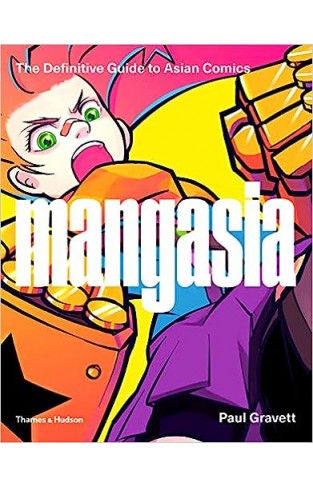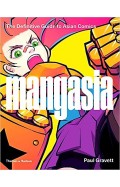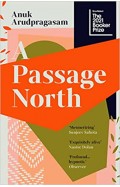- Home
- Books
- Young Adults
- Fiction
- Manga, Comics & Graphic Novel
- Mangasia: The Definitive Guide to Asian Comics
Mangasia: The Definitive Guide to Asian Comics
By: Paul Gravett
-
Rs 8,920.75
- Rs 10,495.00
- 15%
You save Rs 1,574.25.
Due to constant currency fluctuation, prices are subject to change with or without notice.
A comprehensive visual survey of comic-art styles and themes throughout Japan and Asia
An exhaustive and visually engaging account, Mangasia charts the evolution of manga from its roots in late nineteenth-century Japan through the many and varied forms of comics, cartoons, and animation created throughout Asia for more than one hundred years.
World authority on comic art Paul Gravett details the evolving meanings of the myths and legends told and retold by manga artists of every decade and reveals the development and cross pollination of ideas between manga artists throughout Asia. He explores the explosion of creativity in manga after the Second World War and highlights how creators have responded to political events since 1950 in the form of propaganda, criticism, and commentary in manga magazines, comics, and books.
With maps, timelines, and reproductions from Japan, China, Taiwan, North Korea, South Korea, Thailand, Malaysia, Indonesia, Cambodia, the Philippines, Vietnam, India, and Bangladesh, this book is the first to explain the significance of key themes, the meanings of embodied myths, and the connections between various manga traditions.
800+ illustrations, 500+ in colorA comprehensive visual survey of comic-art styles and themes throughout Japan and Asia
An exhaustive and visually engaging account, Mangasia charts the evolution of manga from its roots in late nineteenth-century Japan through the many and varied forms of comics, cartoons, and animation created throughout Asia for more than one hundred years.
World authority on comic art Paul Gravett details the evolving meanings of the myths and legends told and retold by manga artists of every decade and reveals the development and cross pollination of ideas between manga artists throughout Asia. He explores the explosion of creativity in manga after the Second World War and highlights how creators have responded to political events since 1950 in the form of propaganda, criticism, and commentary in manga magazines, comics, and books.
With maps, timelines, and reproductions from Japan, China, Taiwan, North Korea, South Korea, Thailand, Malaysia, Indonesia, Cambodia, the Philippines, Vietnam, India, and Bangladesh, this book is the first to explain the significance of key themes, the meanings of embodied myths, and the connections between various manga traditions.
800+ illustrations, 500+ in colorMangasia: The Definitive Guide to Asian Comics
By: Paul Gravett
Rs 8,920.75 Rs 10,495.00 Ex Tax :Rs 8,920.75
Zubin Mehta: A Musical Journey (An Authorized Biography)
By: VOID - Bakhtiar K. Dadabhoy
Rs 892.50 Rs 1,050.00 Ex Tax :Rs 892.50
The Origins of Political Order From Prehuman Times to the French RevolutioN
By: Francis Fukuyama
Rs 4,045.50 Rs 4,495.00 Ex Tax :Rs 4,045.50
Manning Up: How the Rise of Women Has Turned Men into Boys
By: Kay Hymowitz
Rs 845.75 Rs 995.00 Ex Tax :Rs 845.75
The Obama Syndrome: Surrender At Home War Abroad
By: Tariq Ali
Rs 1,100.75 Rs 1,295.00 Ex Tax :Rs 1,100.75
The Quest For Meaning: Developing A Philosophy Of Pluralism
By: Tariq Ramadan
Rs 1,185.75 Rs 1,395.00 Ex Tax :Rs 1,185.75
The Pakistan US Conundrum Jihadists The Military And The People The Struggle For Control
By: Yunas Samad
Rs 1,185.75 Rs 1,395.00 Ex Tax :Rs 1,185.75
An Enemy We Created: The Myth Of The Taliban Al Qaeda Merger In Afghanistan 19702010
By: Alex Strick van Linschoten
Rs 4,197.50 Rs 8,395.00 Ex Tax :Rs 4,197.50
WikiLeaks: Inside Julian Assanges War on Secrecy
By: David Leigh & Luke Harding
Rs 637.50 Rs 850.00 Ex Tax :Rs 637.50
No similar books from this author available at the moment.
Attack on Titan - The final season
By: Hajime Isayama
Rs 15,115.50 Rs 16,795.00 Ex Tax :Rs 15,115.50
Zubin Mehta: A Musical Journey (An Authorized Biography)
By: VOID - Bakhtiar K. Dadabhoy
Rs 892.50 Rs 1,050.00 Ex Tax :Rs 892.50
Mangasia: The Definitive Guide to Asian Comics
By: Paul Gravett
Rs 8,920.75 Rs 10,495.00 Ex Tax :Rs 8,920.75














-120x187.jpg?q6)





-120x187.jpg?q6)



-120x187.jpg?q6)










